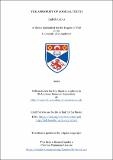Files in this item
The apriority of logical truth
Item metadata
| dc.contributor.advisor | Sullivan, Peter M. | |
| dc.contributor.advisor | Johnston, Colin | |
| dc.contributor.author | Lobus, Indrek | |
| dc.coverage.spatial | 171 | en_US |
| dc.date.accessioned | 2023-02-28T09:09:33Z | |
| dc.date.available | 2023-02-28T09:09:33Z | |
| dc.date.issued | 2023-06-12 | |
| dc.identifier.uri | https://hdl.handle.net/10023/27072 | |
| dc.description.abstract | I defend the claim that knowledge of logical truths does not depend on experience, that it is a priori knowledge. In chapter I, I introduce and clarify the idea of a priori knowledge, and in chapter II, I respond to a widespread objection to it derived from Quine’s critique of analyticity. In chapter III, I distinguish between two approaches to developing an account of a priori knowledge, one that ties apriority to the cognitive abilities of knowers and another that ties it to features of truths known. I motivate the second approach over the first. In chapter IV, I sketch an outline of how the second approach could lead to an account of the apriority of logical knowledge. In the final three chapters, I develop an account which follows the outline. In chapter V, I introduce the Fregean idea of logic as a study of the laws of truth which I spell out with the help of the semantic conception of truth developed by Tarski. In chapter VI, I defend an idea found in Wittgenstein’s Tractatus that the signs for logical operations cannot be construed as having objects corresponding to them. The defence proceeds via a defence of Frege’s Context Principle. A consequence of the Tractarian idea is that logical truths are not expressions of thought, that they are truths without a truth-condition. In the last chapter, I spell out the epistemic implications of this idea, that an understanding of truth is accompanied by knowledge of every logical truth and that any acquisition of knowledge by experience therefore presupposes logical knowledge, meaning that logical knowledge itself cannot depend on experience or any other means of learning. | en_US |
| dc.language.iso | en | en_US |
| dc.rights | Creative Commons Attribution-NonCommercial-ShareAlike 4.0 International | * |
| dc.rights.uri | http://creativecommons.org/licenses/by-nc-sa/4.0/ | * |
| dc.subject | Logic | en_US |
| dc.subject | Knowledge | en_US |
| dc.subject | Epistemology | en_US |
| dc.subject | A priori | en_US |
| dc.subject | Wittgenstein | en_US |
| dc.subject | Rationalism | en_US |
| dc.subject.lcsh | Logic--Philosophy | en |
| dc.subject.lcsh | Knowledge, Theory of | en |
| dc.subject.lcsh | A priori | en |
| dc.title | The apriority of logical truth | en_US |
| dc.type | Thesis | en_US |
| dc.contributor.sponsor | Templeton Foundation | en_US |
| dc.contributor.sponsor | University of Stirling | en_US |
| dc.type.qualificationlevel | Doctoral | en_US |
| dc.type.qualificationname | PhD Doctor of Philosophy | en_US |
| dc.publisher.institution | The University of St Andrews | en_US |
| dc.publisher.department | The University of Stirling | en_US |
| dc.identifier.doi | https://doi.org/10.17630/sta/308 | |
| dc.identifier.grantnumber | 58450 | en_US |
The following licence files are associated with this item:
This item appears in the following Collection(s)
Except where otherwise noted within the work, this item's licence for re-use is described as Creative Commons Attribution-NonCommercial-ShareAlike 4.0 International
Items in the St Andrews Research Repository are protected by copyright, with all rights reserved, unless otherwise indicated.


